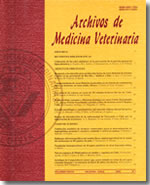Assesment of the TEI index of myocardial performance in dogs with doxorubicin-induced cardiomiopathy
Main Article Content
Abstract
The development of a dose-dependent cardiomyopathy is the main limitation for the use of doxorubicin in chemotherapy protocols in both humans and animals. In this setting, the global myocardial function may be compromised resulting in signs of congestive heart failure. In this study, we investigated the ability of the Tei index of myocardial performance to identify myocardial dysfunction in healthy dogs receiving doxorubicin to a cumulative dose of 210 mg/m2 over 147 days, comparing it with other standard echocardiographic indicators of systolic and diastolic function. Our results indicated that the Tei index, the isovolumic relaxation time, pre-ejection period and the pre-ejection period-to-left ventricular ejection time ratio were able to identify the cardiotoxic effects of doxorubicin on cardiac function when only 60 mg/m2 had been administered, while the standard systolic and diastolic parameters, including left ventricular diameter at systole, ejection fraction, and fractional shortening needed at least 120 mg/mg2 to deteriorate. We concluded that prolonged anthracycline therapy compromises both systolic and diastolic functions, which may be documented earlier by including the Tei index evaluation to the standard echocardiographic assessment of animals receiving doxorubicin.

